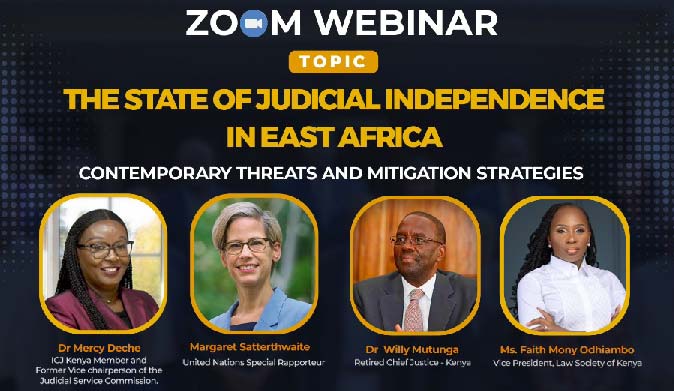REPORT ON THE STATE OF JUDICIAL INDEPENDENCE IN EAST AFRICA: CONTEMPORARY THREATS AND MITIGATION STRATEGIES WEBINAR.
1 FEBRUARY 2024.
Background.
Globally authoritarian regimes have eroded public trust and delegitimized Judiciaries. By clawing at its independence and spreading disinformation and false narratives about the Judiciary, authoritarian regimes can undermine public confidence in its independence and impartiality[1].
A consequence of authoritarian regimes is that they can enact legal reforms or constitutional amendments that grant them greater control over the Judiciary. Securing the principles of the rule of law, transparency, accountability, and separation of powers is crucial to safeguard judicial independence and accountability mechanisms in the face of increasing authoritarianism. It requires strong constitutional, legal frameworks, robust policy and institutional safeguards, and a commitment to promoting the rule of law. International support and regional pressure can protect judicial independence through a vigilant civil society, the media, and other democratic institutions.
Similarly, authoritarianism significantly threatens judicial independence’s capacity to uphold and protect individual rights, ensuring accountability and preserving the integrity of democratic systems in the face of these challenges.
Introduction
- The Africa Judges and Jurists Forum (AJJF) in collaboration with the International Commission of Jurist (ICJ) Kenya, the East Africa Law Society, Tanganyika Law Society, and Southern and Eastern Africa Chief Justices’ Forum (SEACJF) held a Webinar on the 1st February 2024 to discuss the contemporary threats to judicial independence in East Africa and identify measures to address and mitigate the threats.
- The Webinar was moderated by Dr. Justice Alfred Mavedzenge (Programs Director, AJJF) and the welcome remark was made by Martin Okumu Masiga (Secretary General AJJF)
- The panelists were as follows:
- Prof Margaret Satterthwaite: UN Special Rapporteur on Independence of Judges and Lawyers;
- Dr Willy Mutunga, Retired Chief Justice of the Republic Kenya;
- Ms Faith Mony Odhiambo Vice President, Law Society of Kenya;
- Dr Mercy Deche, Member ICJ Kenya, former Vice Chairperson, Judicial Service Commission
- A total of 190 participants attended the webinar and these included judges, lawyers, representatives of civil society organisations, academia and members of the general public.
- The UN Special Rapporteur drew attention to the United Nations Basic Principles on the Independence of the Judiciary, which underscores the importance of observing the separation of powers as a way of guaranteeing the independence of the judiciary.
- It was further noted that a healthy democracy can only be guaranteed where there is equality before the law and this can be achieved if the judiciary is independent to apply the law impartially
- Protecting the independence of the judiciary is a vital means of preventing arbitrariness, autocracy and violation of human rights. Thus, society should be governed by predictable laws as interpreted by an independent judiciary, rather than the will of the executive.
- Disciplining judges for unethical conduct should be done through appropriate independent institutions, such as Judicial Service Commissions, rather than by the executive arm of government.
The following were identified as the key contemporary threats and challenges against judicial independence in East Africa:
- Unlawful suspension and dismissal, as well as threatened impeachment of independent judges, by the government.
- Undue interference (direct and indirect) with judicial processes by members of the bar associations, powerful religious groups, ethnic groups, members of the families of judicial officers, judges, government officials.
- Underfunding of the judiciary, and or withholding of funds by political actors when the judiciary insists on its independence
- Harassment of members of the judiciary by government officials and politicians, including through open and subtle threats, and unsubstantiated allegations of unethical conduct.
- Failure to hold accountable government officials and other actors who undermine judicial independence.
The following measures were proposed to address the threats against judicial independence in East Africa:
- The judiciary, bar associations and civil society was encouraged to bring threats to judicial independence to the attention of the United Nations Special Rapporteur on the Independence of Judges and Lawyers as well as the African Commission on Human and Peoples’ Rights. The United Nations Special Rapporteur on the Independence of Judges and Lawyers explained the procedures for filing complaints on violations of judicial independence.
- The judiciary must be courageous. Judicial officers must show that they are courageous by being bold and not succumbing to intimidation.
- The public and judicial appointing authorities were called upon to ensure that only individuals of high personal and professional integrity are appointed into the judiciary. Judicial officers who lack integrity are the most vulnerable to interference.
- The public, lawyers and civil society was encouraged to ensure that government undertake measures necessary to enable and enhance the independence of judicial appointing authorities.
- The Public, civil society, associations of judges and bar associations were called upon to provide solidarity to judges who are persecuted for exercising their functions independently and impartially.
- Judiciaries were called upon to always exercise their functions transparently in order to create and maintain public confidence in their integrity and independence.
- National governments were called upon to provide sufficient funding and other resources for the judiciary.
For more information:
Martin Okumu-Masiga, Secretary General of AJJF,
email: okumu-masiga@africajurists.org
mobile: +256 753 954 308, Twitter: @mokumas
Dr. Justice Alfred Mavedzenge, Programs Director,
email: justice-mavedzenge@africajurists.org
mobile: +27 79 388 9990, Twitter: @Dr_JAMavedzenge
Elizabeth Oriakhogba, Legal Advisor, AJJF,
email: elizabeth.oriakhogba@africajurists.org
mobile: +234 813 128 8602, Twitter: @Leezy_O
Twitter @AfricanJurists, Website https://africajurists.org/ FB- Africa Judges and Jurists Forum.

